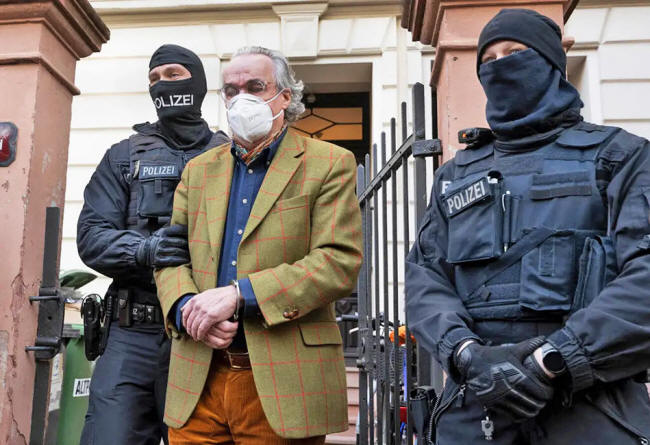|
Christopher F. Schuetze, Melissa Eddy and Gaia Pianigiani
contributed reporting from NYTimes Website
Similar report in Spanish to a far-right domestic terrorist group were arrested across the country for allegedly planning to overthrow the government and install a prince as the new head of state.
Credit Carsten Koall/Getty Images were a German prince, a former far-right member of Parliament, an active soldier and former members of the police and elite special forces...
BERLIN
The plan was to storm the German Capitol, arrest lawmakers and execute the chancellor.
A prince descended from German nobility would take over as the new head of state, and a former far-right member of Parliament would be put in charge of a national purge.
That is what German prosecutors and intelligence officials say a nationwide far-right terrorist network was plotting before 3,000 police officers and Special Forces fanned out across the country on Wednesday to raid 150 homes and arrest 25 suspected co-conspirators.
They included,
Among the items uncovered was a list containing 18 names of politicians considered enemies, possibly to be deported and executed, among them Chancellor Olaf Scholz, people familiar with the raids told The New York Times, requesting anonymity because they were not authorized to discuss the investigation.
This was the latest of a series of plots discovered in recent years of extremist networks preparing for a day the democratic order collapses, a day they call Day X, the subject of a New York Times podcast series last year.
Visitors taking photos outside the Reichstag, the seat of Germany's Parliament, at dusk on Wednesday. Prosecutors say the building would have been a target of the plot. Credit Sean Gallup/Getty Images
It is not clear how capable the plotters would have been at executing such an attack, nor how close they were to carrying out their plan:
But many of those arrested were known to be heavily armed, prosecutors said, describing the plot as possibly the most brazen in Germany's postwar history - one aimed directly at the heart of the state.
Beyond the immediate threat, the scale of the raids and the ambition
of the plot prosecutors outlined pointed to persistent
vulnerabilities to extremism in Germany's core institutions - its
Parliament, its judiciary, its local and state police, and even its
most elite military forces - which the German authorities have
struggled to root out in recent years.
Among those detained around the country were,
Federal prosecutors said that they
were investigating a total of 27 other suspects as well.
fanned out across the country on Wednesday to raid 150 homes in 11 German states and arrest 25 suspected co-conspirators. Credit Filip Singer/EPA-EFE, via Shutterstock
In recent years, and especially since the
'pandemic,' the group gained
new energy as its followers and thinking combined with the
conspiracy theories of the QAnon movement, in particular seeing a
threat from the so called "deep state," a shadowy cabal of corrupt
elites they imagine running the government.
in the spa town of Bad Lobenstein in the German state of Thuringia. Credit Matthias Rietschel/Reuters
...that needed to be
overthrown, a statement from prosecutors said.
Members of the military
faction had also been active in the federal armed forces, he said.
It was not the first plot against government officials that law
enforcement agencies have foiled this year.
The police said that the suspects were linked to the
Reichsbürger and anti-vaccine movements.
The plot is only the latest in a series discovered in recent years. Credit Tilman Blasshofer/Reuters
The German publication Der Spiegel reported that she had posted regularly on Telegram using the slogan "WWG1WGA," which stands for the QAnon slogan,
Spiegel said she
deleted the posts after it questioned her.
The ringleader of the group was identified as Prince Heinrich XIII of Reuss, the 71-year-old descendant of a former German royal family.
He was designated to take over as the new head of state.
to a police vehicle during a raid on Wednesday in Frankfurt. In the plot, he was designated to take over as the new head of state. Credit Boris Roessler/DPA, via Associated Press
Prince Heinrich XIII had tried to make contact with representatives of the Russian government through the Russian Embassy in Berlin.
A
Russian citizen, whom the prosecutors identified as "Vitalia B.," is
believed to have helped him in trying to establish contact with
Moscow. But prosecutors said there were no indications that they had
received a positive response from the Russian sources they had
contacted.
Germany's intelligence services have for years said that the greatest threat to the country came from domestic, far-right extremist groups.
Right-wing extremists in 2019
killed a local politician in the
German state of Hessen, and in the same year
tried to attack a synagogue. A year
later, a far-right terrorist killed nine immigrants and descendants
of immigrants.
Video
Also
HERE...
|







